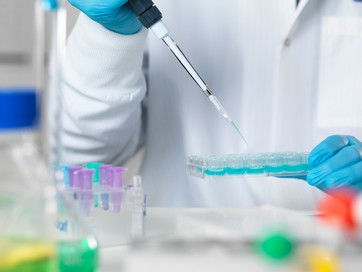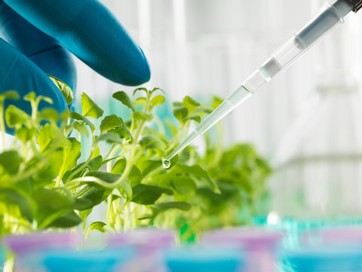

Agriculture Biotechnology
 |
 |
Course Length:
Semester
Recommended Grades:
11-12
Course Description:
Biotechnology is a vast and rapidly growing field of study around the world. The largest sector of biotechnology lies within the agriculture industry. With the world's population on the rise and the land/resources to grow and raise food decreasing, the use of biotechnology is a must to ensure the world's food supply. Along with the agriculture side of biotechnology, other sectors will also be addressed that include; food, natural resources, medical, and genetics.
Courses Rationale:
Agricultural biotechnology is anticipated to experience a growth of over 55% within the next five years. The most prominent areas of that anticipated growth are located within the crop and livestock industry. This course in Agriculture Biotechnology is designed to provide students with basic lab practices as well as knowledge and skills in the biotechnology applications of plant and animal science. The utilization of appropriate equipment and technology by the students will enhance classroom learning and laboratory content application. Mathematics, English, biology, and human relations skills will also be reinforced within the course. This course includes topics in the history of biotechnology, the principles of scientific research, cell biology, genetic transfer, genetically modified organisms, cloning, and the application of biotechnology to plant science, animal science, medicine, food, and the environment. The major consumer issues, ethics, and careers involved with Biotechnology will also be addressed in this course. The FFA is an integral part of an Agricultural Education program and will be incorporated into classroom work as well. FFA membership is strongly encouraged!
Course Goals/Projects:
Students will recognize the uses and benefits of biotechnology.
Students will perform experiments and follow proper laboratory protocols.
Students will identify the components and structure of cells and demonstrate
their importance in genetic theory.
Students will examine and understand the processes of the application of
biotechnology to plant, animal, food, and environmental sciences.
Students will practice and apply biotechnology procedures in the Food industry.
Students will discuss controversial and ethical issues within Ag. Biotechnology.
Students will outline and evaluate potential careers within Ag. Biotechnology.
Students will improve their interpersonal, verbal and written communication
skills.
Course Standards:
·
B1.1 Illustrate the meaning and effects of biotechnology for human benefit.
·
B1.2 Employ proper protocol for aseptic technique.
·
B2.1 Recognize components of cells and their application to genetic improvement.
·
B2.2 Illustrate the role of cell structures in genetic theory.
·
B3.1 Apply procedures used in biotechnology to plant processes.
·
B3.2 Demonstrate procedures used in biotechnology to plant propagation.
·
B4.1 Evaluate procedures used in biotechnology in animal reproduction.
·
B4.2
Examine procedures used in biotechnology in animal disease management.
·
B4.3
Evaluate procedures used in biotechnology in animal systems alteration.
·
B5.1 Apply procedures used in biotechnology in the environment.
·
B6.1 Evaluate controversial issues of biotechnology as they apply to the human
race.